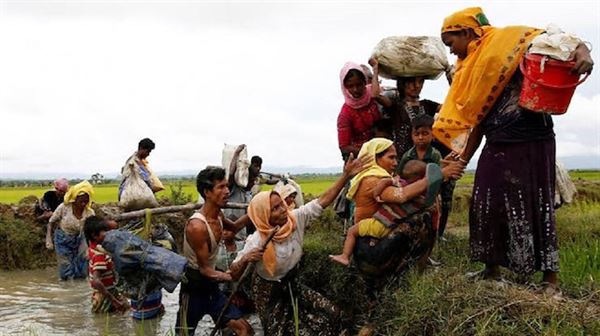When Myanmar's state counselor arrived at the Hague to defend her country at the International Court of Justice (ICJ), several rights groups launched
When Myanmar’s state counselor arrived at the Hague to defend her country at the International Court of Justice (ICJ), several rights groups launched a global boycott initiative urging corporations, foreign investors, professional and cultural organizations to sever their institutional ties with Myanmar.
Thirty Human rights, academic and professional organizations from 10 countries jointly launched the “Boycott Myanmar Campaign” from London, in hopes to “bring to bear economic, cultural, diplomatic and political pressure on Myanmar’s coalition government of [state counselor] Aung San Suu Kyi and the military”, the campaigners said in a statement.
Myanmar faces a lawsuit at the ICJ filed by West African country Gambia, with the support of the Organization of Islamic Cooperation, for atrocities against Rohingya Muslims in the country over the past few years.
Suu Kyi, a Nobel Peace Prize Laureate, said in a statement last month that she, as foreign minister, is to attend the first hearing of the lawsuit on Dec. 10, to defend “the interests of the country”.
The latest massive military crackdown on Rohingya Muslims in the northern Rakhine state of Myanmar in 2017 forced more than 750,000 Rohingya refugees, mostly women and children, to flee the country and cross into Bangladesh.
Since Aug. 25, 2017, nearly 24,000 Rohingya Muslims have been killed by Myanmar’s state forces, according to a report by the Ontario International Development Agency (OIDA).
More than 34,000 Rohingya were also thrown into fires, while over 114,000 others were beaten, said the OIDA report, titled “Forced Migration of Rohingya: The Untold Experience.”
Some 18,000 Rohingya women and girls were raped by Myanmar’s army and police and over 115,000 Rohingya homes were burned down and 113,000 others vandalized, it added.
Suu Kyi is widely criticized for her silence against the mass killings and war against humanity as she now attempts to defend against alleged military atrocities — which the UN human rights chief described as a “textbook example of ethnic cleansing” — at the international court.
The Boycott Myanmar Campaign began with an online petition drive, urging the Norwegian Nobel Committee to strip Suu Kyi’s Nobel prize awarded to her 28 years ago, arguing she is “wholly unworthy” of the honor.
Nay San Lwin, the Germany-based co-founder of the Free Rohingya Coalition and one of the initiators of the campaign, said: “On behalf of the Rohingya community of survivors, I therefore urge you to use your liberty and power, as citizens and consumers, both individually and as representatives/members of activist networks, religious communities, educational institutions, or professional or parliamentary associations, to cut any and all institutional and formal ties with Myanmar.”
The global campaign was jointly initiated by 30 organizations including the Free Rohingya Coalition, Forsea.co, Restless Beings, Destination Justice, Rohingya Human Rights Network of Canada, Rohingya Human Rights Initiative of India, Korean Civil Society in Solidarity with Rohingyas, and Asia Centre.
The campaigners intend to go beyond targeting “the military [of Myanmar] and its international business ties, to send a strong, united message of denunciation and disapproval to the Burmese civil society.”
“Groups such as former political prisoners’ networks, Buddhist monks and nuns, Burmese media outlets, university departments, lawyers’ associations, merchants’ associations are currently serving as popular cheerleaders in support of the Myanmar government’s systematic destruction of Rohingya identity, history and physical existence, with mass rallies being held throughout Myanmar and in diaspora.” the statement said.
Maung Zarni, a veteran Myanmar human rights activist expressed his “unequivocal support” for the campaign.
“I am a Burmese [Myanmar] and a Buddhist from an extended military family… My country of birth is like Nazi Germany of 1930’s. It is not only the Burmese military who pull the trigger on thousands of Rohingyas that are guilty of genocide, but also the public who view and treat Rohingyas in the same way the Nazi Germans discriminated, excluded and ostracized Jews and other national minorities,” said Zarni, who first alerted the world to alleged moves in his country against the Rohingya in 2013.
Several other Rohingya rights group, including the European Rohingya Council and Myanmar Muslim Association Netherlands announced they would stage Rohingya solidarity rally on Tuesday and Wednesday in front of the ICJ “to seek justice for the persecuted Rohingya community.”
A number of rebel groups fighting the military in different part of Myanmar said they were ready to provide “evidence of war crimes” committed by the military not only against Rohingya but also against the other ethnic minorities in Myanmar.
In addition to the ICJ, Myanmar will face two more international lawsuits — one at the International Criminal Court at the Hague and the other at a court in Argentina — against the military atrocities.
